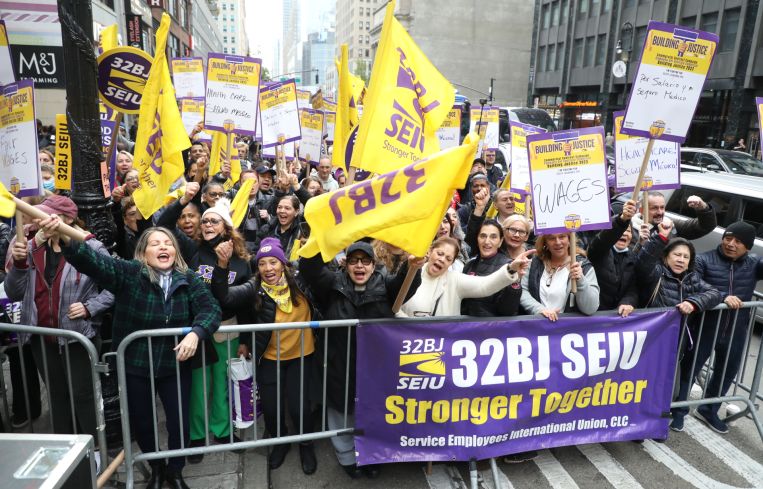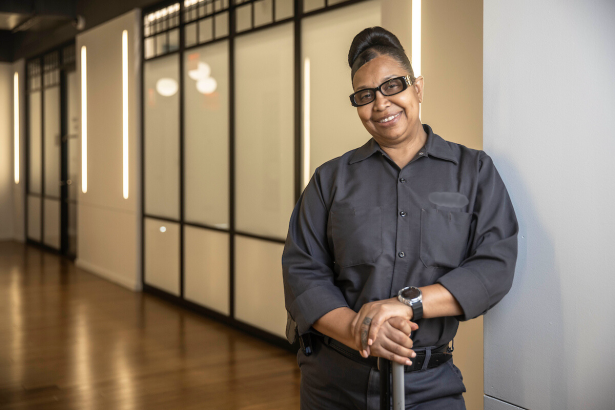NYC Commercial Building Workers Hope for a Deal, but Brace for a Strike
Amid high office vacancy, commercial landlords want building workers to make concessions
By Abigail Nehring December 7, 2023 4:11 pm
reprints
Three years ago, they were deemed “essential” to the city’s day-to-day functioning. Now some 20,000 office cleaners, porters, and superintendents are fighting to keep their benefits and other labor protections in place after their contract expires Dec. 31.
Members of 32BJ Service Employees International Union kicked off contract bargaining for New York City commercial building workers last month for the first time since 2019. Across the table, the owners of some 900 commercial buildings — represented by the Realty Advisory Board (RAB) — point to their own battle scars from the pandemic.
Manhattan’s office vacancy rate is hovering at 15.4 percent and a record 19.8 percent of the borough’s office space is available or being marketed for lease, according to CBRE’s report for the third quarter of 2023. The owners of office buildings around the country are finding it harder to get new loans on their properties, forcing many to default on existing loans or simply give back the keys to their lenders.
Because of all of that, RAB wants historic concessions it calls “enhanced flexibility” as part of the contract negotiations. That means building workers contributing toward the cost of health insurance premiums, fewer paid sick and vacation days, cuts to overtime, and lower wages for new hires.
Union leaders say this list of demands is “insulting,” and members are taking steps to prepare for a strike if they can’t come to an agreement.
“Should you choose health insurance, or rent? Health insurance or taking care of your kids?” 32BJ President Manny Pastreich said. “It’s not a real choice. It’s a choice that no one should have to make.”
The two sides haven’t been further apart since 1996, when building cleaners went on strike for 31 days.
Comparisons to the Giuliani-era strike have become a flashpoint in this year’s bargaining sessions, since “it’s no great secret, the ’90s were not a great time for commercial real estate,” said RAB Executive Vice President Robert Schwartz.
The tribulations of the city’s gleaming towers link their owners to those who clean them, though the latter face far greater precarity. A report by the Fund for New York City in April found that the city is currently in one of the worst affordability crises in the past two decades, with half of the city’s households not having enough money to be able to live in the five boroughs, the New York Times reported.
“We do our jobs with pride, but I live paycheck to paycheck,” Leila Mcleod, a single mother and one of about 500 captains throughout the city helping members gear up for a possible walkout before the end of the month, told Commercial Observer.

Mcleod pays $10.50 for a round-trip train fare to commute every day from Newark, N.J., to Related Companies’ 55 Hudson Yards, a 51-story office tower completed in 2019. If she takes the bus instead, the two-way trip costs her $12.50.
Mcleod said it’s not unusual to have to choose which bills to pay late — her phone, rent or car insurance. Thanks to Brooklyn’s sky-high rent, she said she was priced out of New York City — her home since arriving in the country from Panama City as a teenager — and settled in New Jersey just before the pandemic.
A staff of about 70 at the Hudson Yards building where Mcleod is employed kept things running smoothly throughout the pandemic. Several of her colleagues at the site who came down with COVID-19 died of the disease, she said.
A spokesperson for Related said in an email the company continued to operate its residential and commercial building during the pandemic and “recognizes the importance of the work that our frontline staff did during that difficult time.”
Similar stories played out across hundreds of buildings in Manhattan, the largest office market in the country with an inventory of about 540 million square feet, according to market research by Colliers.
About 7,000 commercial building workers were laid off when office buildings shuttered in 2020 — a third of the city’s commercial building workforce. And about 2,000 of those jobs have disappeared permanently, according to the union.
After being on the front lines, taking a pay cut to go toward the cost of health insurance premiums “is like a killer to us,” Mcleod said.
Few U.S. employers cover workers’ health insurance premiums in full — with the Bureau of Labor Statistics finding about 95 percent of employees kick in for a portion — but 32BJ’s Pastreich said it’s been a century-long battle to win that benefit for its workers.
Pastreich believes having their premiums fully covered is one reason why building workers have one of the best labor contracts in the country, and he said 32BJ isn’t about to let that go.
“Having said that, there is a downturn in the market, and I think that we need to work cooperatively to figure out how we provide a path forward for the commercial real estate industry, how we pass legislation to increase density, to support conversions of Class B and C buildings from commercial to residential,” Pastreich said.
While industry leaders and city officials debate remedies for the decline and fall of New York’s office market, the last three years have taken a clear toll on Manhattan’s asking rents, which averaged $76.38 in the third quarter of 2023, compared to the all-time high of $80.46 in 2019, according to CBRE. Far fewer workers are commuting to their offices now than before the pandemic.
“The fact of the matter is, there’s just less work to go around right now,” RAB’s Schwartz said.
But the industry has been unsuccessful in several attempts in recent years to gain ground on worker contributions to insurance premiums, among other issues.
Last year, 32,000 32BJ doormen and other residential building service workers narrowly avoided a strike during contract negotiations in which many of the same issues were at play, including premium sharing. With the strike date approaching, Gov. Kathy Hochul weighed in to support the union, propelling the contract past the finish line.
A year later, commercial building workers face a similar uphill battle and some politicians have already thrown support behind their efforts.
Union members met with New York City Council Speaker Adrienne Adams at 32BJ’s Flatiron District headquarters on Dec. 1.
“As the daughter of union workers, I am proud to stand in solidarity with 32BJ’s commercial cleaners who are fighting for a fair contract,” Adams told a crowd of several hundred union members. “Workers are the backbone of our communities, and their contracts should reflect the value of their labor, and the dignity and respect they deserve.”
A spokesperson for the union said daily strike preparations will begin Dec. 14, with a large rally scheduled for Dec. 20.
The next bargaining sessions will take place on Dec. 12 and 21.
Abigail Nehring can be reached at anehring@commercialobserver.com.



